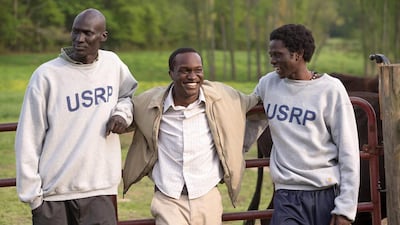The Good Lie star Arnold Oceng hopes the film can be 'more than a movie' and help to bring real change to those caught in the lengthy civil war in Sudan.
“Reese Witherspoon’s character in the movie, like most Westerners, if she doesn’t know about a situation like Sudan – she doesn’t care,” he says. “But as she learns more about our characters’ past, she really wants to help.
"I hope the same thing is going to happen when people watch the film and are affected by what they've seen and they want to help too. That's why the producers have set up The Good Lie Fund. You can go on there and donate whatever you can to help the people in the refugee camps," says Oceng.
The film tells the story of a group of orphaned Sudanese children, just a few of the “lost boys” of the Sudanese Civil War, who trek thousands of miles to safety, eventually ending up in a refugee camp in Kenya; and 15 years later as refugees in the United States.
When I reviewed the film recently, one reservation I had was that the change in tone from the brutal opening act of dying, starving children to the fish-out-of-water comedy of the latter part of the film could be interpreted as disrespectful to the victims of the war.
I came to the conclusion that since three of the lead actors were themselves children of the violence in Sudan and they were seemingly comfortable with the film, I should probably adopt the same approach.
It was nice, then, to get the opportunity to ask two of the leads in person, particularly Kuoth Wiel who grew up in a refugee camp in Ethiopia.
“I know exactly what you mean,” she says. “When I first read the script I was a bit offended, but then when we started to research, we realised this is how it was.
“Our producer Molly Smith, one of her family had adopted a lost boy and they were telling us how he and his brother didn’t know about oven mitts when they arrived, so they would take it in turns burning their hands each day. That’s honestly how it was for these guys.”
Oceng adds: “I had difficulty with some of those scenes at first, like when I have to be taught to switch on a light. I was like, ‘Hold on, am I being disrespectful? Are Africans going to look at this and say: We’re not that stupid?’ But when I spoke to some lost boys, they were saying, ‘No, this is what happened.’
“One of the guys I spoke to, Emmanuel, told me he thought white people were fallen angels when he arrived. It was the only way he could comprehend that they’d built all these big tall cathedrals and high-rise buildings, so he could only think they were fallen angels.
“It’s only when I heard those stories and I thought, ‘OK if it happened then it’s cool.’ We’ve not had any lost boys come and say it didn’t happen like that.”
Oceng adds that although the film has been screened at the UN and to politicians in Washington, the biggest test for him was when the cast appeared on the Queen Latifah Show with about 30 lost boys. "She had about 30 lost boys on stage with us and at first I was scared, we had an obligation to these people to tell the right story, because it was their story. I was afraid to approach them, but they came over and all hugged me and said: 'You did it brother, you told it exactly how it was.' Once I'd got their validation I was like 'we're good'."
The film’s big box-office draw is, of course Witherspoon, who plays the newly arrived refugees’ recruitment officer, and Oceng is full of praise for his co-star.
“Reese is the best,” he says. “She’s so humble. You forget she’s an A-lister and an Oscar-winner. She’s so humble you forget just how powerful she is.
“This film wouldn’t have been made if she hadn’t agreed to take part. She took on a supporting role, changed her hair colour, she plays quite an unusual role for her. You have to give her full credit for that.”
cnewbould@thenational.ae

